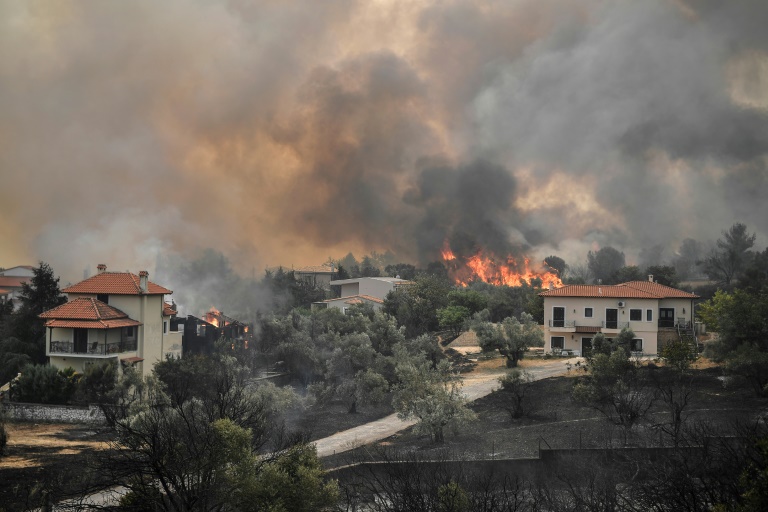Fires raging in Greece claimed their first two lives on Friday during a heatwave that officials said had turned the country into a “powder keg”, while devastating blazes in neighbouring Turkey piled pressure on its government.
Greece and Turkey have been fighting devastating fires for days with the region suffering its worst heatwave in decades — officials and experts linking such intense weather events to climate change.
A UN draft report seen by AFP labelled the Mediterranean region a “climate change hotspot” and warned that heatwaves, droughts and fires would become more fierce in the future, supercharged by rising temperatures.
Hundreds of people have been evacuated in both countries as temperatures hover between 40 and 45 degrees Celsius (104 to 113 Fahrenheit).
One of those killed in Greece was named as Konstantinos Michalos, the president of the Athens Chamber of Commerce and Industry.
He was found unconscious in a factory in Krioneri and was later confirmed dead in hospital.
In Turkey, eight people have been killed and dozens more hospitalised during 10 days of fire.
– ‘Uncontrollable’ –
“Our country is facing an extremely critical situation,” Greek Prime Minister Kyriakos Mitsotakis said.
“We’re facing unprecedented conditions after several days of heatwave have turned the country into a powder keg.”
North of Athens, a fierce blaze tore through vast areas of pine forest, forcing yet more evacuations of villages overnight and blowing thick, choking smoke all over the Greek capital.
Text alerts were sent out to people in Athens warning of “extreme fire danger in the coming days”.
In the small town of Afidnes, 30 kilometres (19 miles) north of the capital, firefighters were seen standing on their truck in the dead of night, dousing flames that leapt high above them.
By morning, the fires had destroyed cars, trees, and houses.
In nearby Krioneri, the fire scorched homes, businesses and factories.
“The fire is uncontrollable,” said resident Vassiliki Papapanagiotis.
“I don’t want to leave, my whole life is here.”
Part of a motorway linking Athens to the north of the country has been shut down as a precaution and a migrant camp was evacuated.
Hundreds of miles southwest in the Peleponnese region roughly 5,000 tourists and residents were forced to flee another fire.
Deputy Civil Protection Minister Nikos Hardalias said that out of 99 fires reported on Thursday, 56 were still active.
At least 450 Greek firefighters have been pressed into service along with water-dropping air support and reinforcements from France, Switzerland, Romania, Sweden, Israel and Cyprus.
– ‘Treachery’ –
More people were forced from their homes on Friday in five Turkish provinces, including tourist hotspots Antalya and Mugla, according to NTV.
President Recep Tayyip Erdogan has faced huge criticism for failing to accept some offers of foreign help after revealing that Turkey had no functioning firefighting planes.
The Turkish government is also facing pressure after the opposition claimed a report by a government agency showed only a fraction of the budget for forest fire prevention had been spent.
“This is a situation that one could go as far as to describe as treachery,” opposition party MP Murat Emir told AFP.
Extreme fires like those in Greece and Turkey will become even worse, the UN’s Intergovernmental Panel on Climate Change warned in a draft report due out next year seen by AFP.
“Climate change is forcing Mediterranean landscapes into a flammable state more regularly by drying out vegetation and priming it to burn,” said Matthew Jones, research fellow at the University of East Anglia’s Tyndall Centre for Climate Change Research.
burs-chv/lc/jxb











